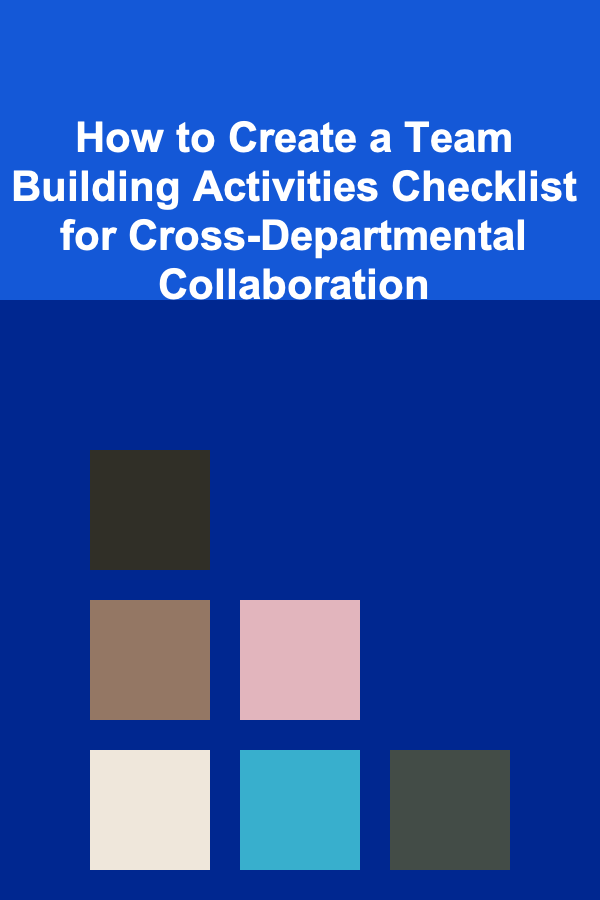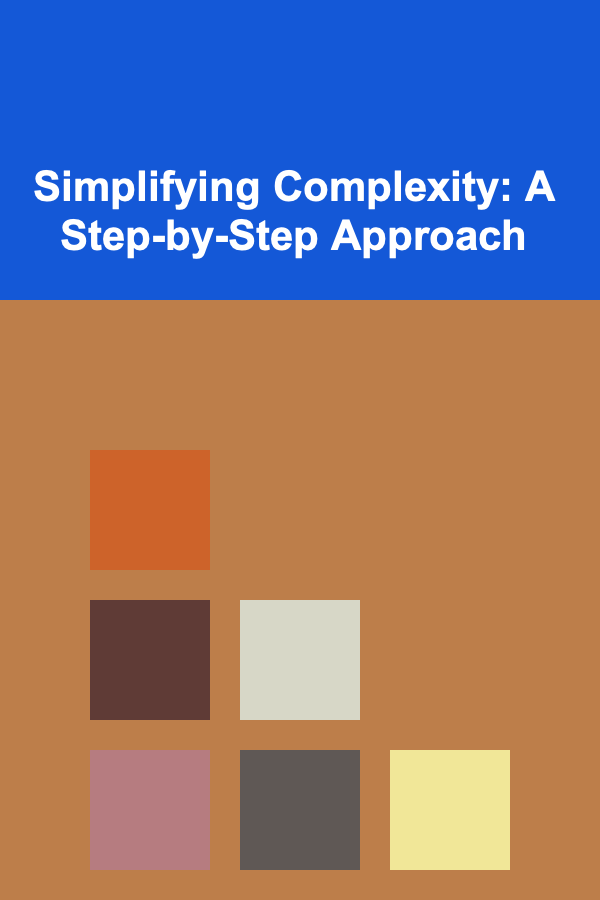
10 Tips for Collaborations Using a Musician Planner
ebook include PDF & Audio bundle (Micro Guide)
$12.99$10.99
Limited Time Offer! Order within the next:
Not available at this time

Collaboration is at the heart of many successful musical projects. Whether you're working with other musicians, producers, or collaborators from different creative disciplines, maintaining organization and communication is crucial for the smooth execution of the project. One of the most effective ways to ensure this is by using a musician planner---an invaluable tool for tracking your progress, setting goals, and staying on top of deadlines.
In this article, we will explore ten tips for using a musician planner to streamline collaborations, stay organized, and ultimately produce your best work. Whether you are a solo artist working with session musicians or part of a larger ensemble, these tips will help you manage both the creative and logistical aspects of your collaboration.
Set Clear Project Goals
One of the first things to establish in any collaboration is clear and well-defined project goals. A musician planner can help you break down the project into manageable steps, making it easier to track progress and keep everyone aligned.
- Define Objectives: Outline what you hope to achieve with the collaboration. Are you working towards an album, a single, a live performance, or something else? Knowing the end goal is essential to creating a roadmap.
- Milestones: Use your planner to set specific milestones. For example, if you're working on a full-length album, set milestones like "complete songwriting," "finish recording drums," "complete mixing," and so on.
By setting clear goals from the outset, you create a shared vision for everyone involved in the collaboration. The musician planner helps to track these objectives and stay focused on the end result.
Create a Collaborative Schedule
In any musical collaboration, everyone involved will have their own schedules and commitments. A well-organized schedule is essential to ensure that everyone is on the same page regarding rehearsal dates, recording sessions, and deadlines for each phase of the project.
- Sync Calendars: Use your musician planner to input all important dates for rehearsals, recording sessions, and meetings. You can also coordinate with collaborators by syncing calendars if you are working remotely or with people in different time zones.
- Block Time for Creative and Logistical Work: When planning, make sure you allocate time for both creative work and the logistical aspects of the project. For instance, block out time for song rehearsals as well as time for administrative tasks like budgeting, booking studios, or organizing gear.
A collaborative schedule helps you and your team stay on track, ensuring that creative work and production tasks are completed efficiently and without unnecessary delays.
Keep Track of Responsibilities and Roles
In any musical collaboration, it's important to clearly define the roles and responsibilities of each participant. A musician planner helps you track who is responsible for what, which helps prevent confusion and ensures that everyone knows their tasks.
- Role Clarification: Outline who is responsible for writing lyrics, composing melodies, recording certain instruments, handling production, or managing logistics. Each collaborator's contributions should be clearly documented in your planner.
- Task Assignment: Use your planner to assign specific tasks to individuals, making it easy to track who is doing what and by when.
Having a detailed breakdown of everyone's roles in your musician planner ensures smooth workflow, reduces misunderstandings, and allows you to hold everyone accountable for their contributions.
Track Song Ideas and Progress
Music is an evolving process, and keeping track of ideas, drafts, and revisions is key to a successful collaboration. A musician planner can be an excellent tool for tracking the progress of each song and the development of ideas.
- Idea Logging: Use your planner to jot down spontaneous song ideas, lyrical themes, chord progressions, and melodies. Having a dedicated space for capturing ideas ensures that you don't forget creative thoughts that may come at any time.
- Version Control: As the song evolves, you can track revisions and versions. This is particularly useful when collaborating with other musicians or producers, as you can note which version of a song is being worked on and the changes made at each stage.
Tracking song progress through your planner keeps the creative process organized and ensures that everyone involved in the collaboration knows what stage each song is at.
Set Deadlines and Reminders
While creativity is essential, deadlines and time management are just as important in any music collaboration. A musician planner can help you set deadlines for every phase of your project, from songwriting to mixing to release.
- Set Specific Deadlines: Use your planner to set specific dates for completing various tasks. For instance, "finish lyrics by June 15," "record vocals by June 30," or "have the final mix ready by July 15."
- Automate Reminders: Most musician planners or apps allow you to set automatic reminders for upcoming tasks. This ensures that important deadlines aren't overlooked and helps you stay on top of your commitments.
Having deadlines and reminders in your planner helps to prevent procrastination and ensures that the project progresses smoothly, keeping everyone on track to meet your goals.
Collaborate on Songwriting and Arrangement Notes
Collaboration often involves different perspectives on song structures, arrangements, and lyrics. Your musician planner can serve as a shared space where you and your collaborators can communicate ideas and decisions.
- Shared Notes: If you're working digitally, use the notes section of your planner to share ideas, lyrics, song arrangements, and any feedback. This way, everyone involved can contribute their thoughts and build on each other's ideas.
- Arrange and Re-arrange: If your collaborators have different visions for how a song should be arranged, you can use your planner to explore various structures and changes, ensuring that all contributions are considered.
Collaboration requires open communication, and having a space for shared songwriting and arrangement notes helps to organize these discussions.
Maintain a Budget for the Project
Music collaborations often involve significant financial commitments, including studio time, equipment rental, travel expenses, and marketing costs. A musician planner can help you keep track of your budget and avoid any financial surprises.
- Budget Tracking: Use your planner to keep detailed records of your project expenses. This can include recording fees, payments to session musicians, transportation, or promotion costs.
- Monitor Spending: Regularly check the status of your budget to ensure you're staying within your means. A musician planner makes it easy to review your financial situation and adjust plans as needed.
Keeping a detailed budget in your planner ensures that you manage the financial aspect of your project effectively and prevent overspending.
Track Equipment and Gear Rentals
For many music collaborations, specialized equipment is required---whether it's instruments, microphones, or software. A musician planner can help you track the gear you need and organize rental agreements.
- Create an Equipment List: Use your planner to list all the gear needed for recording or rehearsals. Include details like rental periods, costs, and return deadlines.
- Track Gear Availability: If you're working with multiple collaborators, ensure that you schedule equipment rentals around everyone's availability to prevent conflicts or delays.
A well-organized list of equipment in your musician planner ensures that you have everything you need when you need it, making the recording process much smoother.
Stay In Touch with Collaborators
Effective communication is essential in any collaboration, especially when working with multiple people. A musician planner can help you organize and track your communication with collaborators, ensuring that everyone is always up to date.
- Contact Information: Keep a list of important contacts in your planner. This includes the details of producers, musicians, session players, and other collaborators involved in the project.
- Meeting Notes: After meetings or brainstorming sessions, use your planner to take notes on decisions made, feedback shared, and action points. This will keep everyone on the same page and reduce miscommunication.
By keeping detailed communication records in your planner, you ensure that important messages and decisions aren't lost, helping to foster a productive working environment.
Evaluate and Reflect on the Collaboration
After completing a project, it's essential to reflect on how the collaboration went. A musician planner can be an excellent tool for evaluating the overall success of the project and identifying areas for improvement in future collaborations.
- Post-Project Review: Use your planner to jot down feedback from yourself and your collaborators about what went well and what could have been improved. This will help you refine your approach to future projects.
- Lessons Learned: Reflect on how your planning and organization impacted the overall outcome of the collaboration. Were there moments where better organization or communication could have enhanced the process?
Reflecting on your project in your planner helps you learn from the experience, ensuring that your next collaboration will be even more successful.
Conclusion
Using a musician planner for collaborations is an incredibly valuable tool for keeping projects organized, ensuring effective communication, and staying on top of deadlines. By setting clear goals, tracking progress, managing budgets, and maintaining a detailed record of all aspects of the collaboration, you can create a smoother workflow and produce better results.
These 10 tips are designed to help you maximize the potential of your musician planner, providing structure and support for all the creative and logistical challenges that come with collaborative music projects. With a little organization and a good planner, you can make sure your collaborations run efficiently, allowing you to focus on the most important part---making music.

Becoming a Successful Retail Manager: Strategies for Boosting Sales and Efficiency
Read More
How to Create a Soundtrack for Mindful Living
Read More
How to Create a Team Building Activities Checklist for Cross-Departmental Collaboration
Read More
How to Protect Earth from Asteroids
Read More
The Art and Science of Whipping Egg Whites to Stiff Peaks: A Comprehensive Guide
Read More
Simplifying Complexity: A Step-by-Step Approach
Read MoreOther Products

Becoming a Successful Retail Manager: Strategies for Boosting Sales and Efficiency
Read More
How to Create a Soundtrack for Mindful Living
Read More
How to Create a Team Building Activities Checklist for Cross-Departmental Collaboration
Read More
How to Protect Earth from Asteroids
Read More
The Art and Science of Whipping Egg Whites to Stiff Peaks: A Comprehensive Guide
Read More